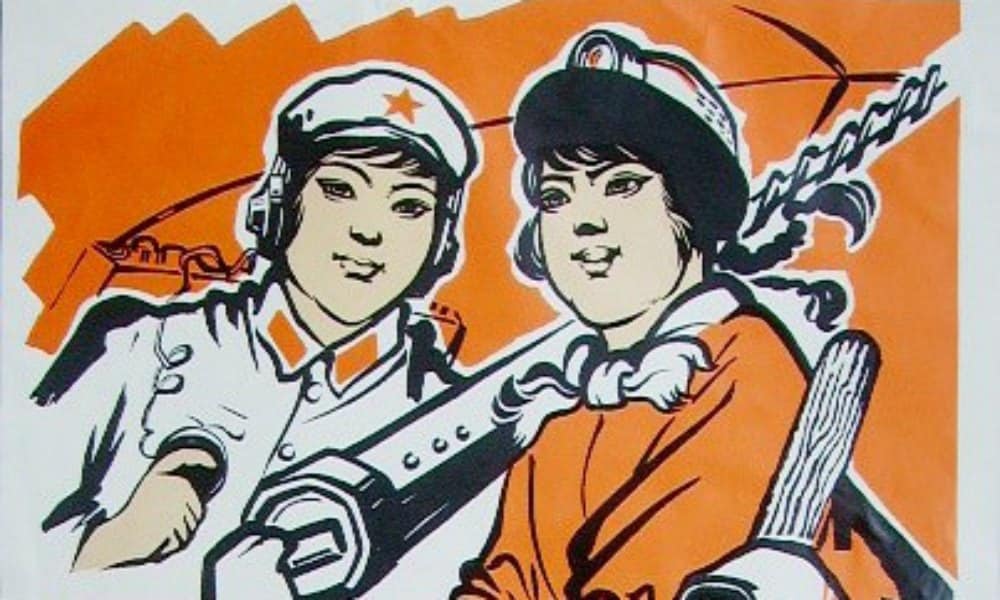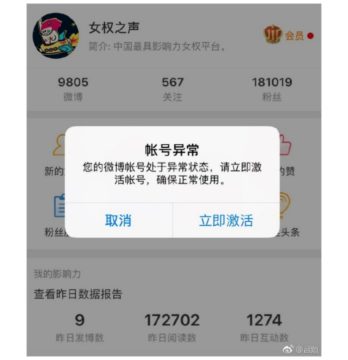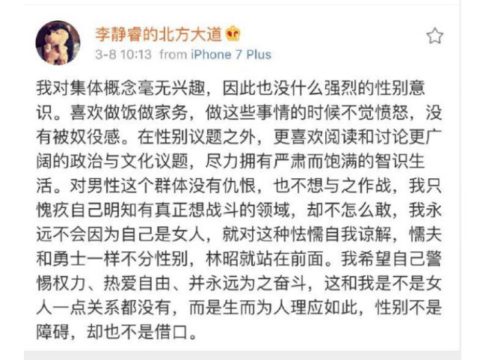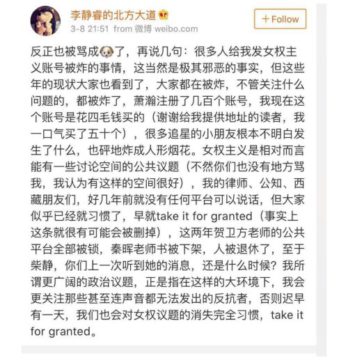Featured
Liberal Writer Li Jingrui Angers Chinese Feminists: “Weaklings and Warriors Are Not Defined by Gender”
Why do prominent mainland liberals speak out against Chinese feminism?
Published
6 years agoon

While Chinese feminist social media accounts are facing an online crackdown, a major discussion has erupted on Weibo after prominent liberal writer Li Jingrui voiced her negative stance on the feminist movement in the PRC today. The incident highlights the existing conflict between ‘mainland liberals’ and ‘mainland feminists.’
In the days following International Women’s Day, discussions on feminism in the PRC have been buzzing on Chinese social media.
A discussion that particularly received attention on Chinese social media this week is one that is taking place between mainland liberal thinkers and Chinese feminists on the issue of women’s power struggle in China.
The discussion was triggered when Li Jingrui (李静睿), a well-known female author and supporter of Chinese democratic activists, spoke out about China’s feminist movement. An online crackdown affecting various feminism-related social media accounts fuelled the debate.
FEMINIST VOICES SILENCED
“The account won’t be reactivated because it has posted ‘sensitive and illegal information.'”
On the eve of March 8, the renowned feminist Weibo account ‘Feminist Voices‘ (@女权之声), which had over 181,000 followers, was pulled offline after it had actively posted about Women’s Day during the day. The Feminist Voices’ Wechat account also disappeared the next day.

The ‘Feminist Voices’ Weibo and Wechat account were taken offline on and after March 8.
The Feminist Voices platform’s founding editor Lü Pin (吕频) spoke out on Twitter about the issue, saying that she was told by Sina Weibo’s customer service staff that the account would not be reactivated because it has posted “sensitive and illegal information.”
Lü Pin stated that preceding the account’s deletion, Feminist Voices had encouraged people on Weibo to announce their “anti-sexual harassment declaration” in response to the international #MeToo campaign.
Besides Feminist Voices, other accounts were also affected by the online crackdown around Women’s Day 2018. Amongst them was the ‘Feminist Forum’ (女权主义贴吧), which saw more than 19,000 Weibo posts erased from the internet by late February.
THE LI JINGRUI CONTROVERSY
“I would never use my female sex as an excuse for being weak. Weaklings and warriors are not defined by gender.”
While the heightened censorship caused outrage amongst many feminists on social media, a controversial post by the liberal writer and former legal journalist Li Jingrui (李静睿) popped up on Weibo. Li is well known for her involvement in social justice movements together with her husband Xiao Han (萧瀚), a prominent liberal scholar.

One of the Weibo posts by Li Jingrui triggering debate on Weibo.
In her post, Li addressed the Chinese feminist movement, writing:
“I have no interest in the concept of social collectives, and I have no strong sense of gender awareness. I like to cook and do housework. I don’t feel angered when I do these things, nor do I feel enslaved. Instead of focusing on gender issues, I prefer to study and discuss broader political and cultural issues, and spare no efforts to lead a serious and full intellectual life. I feel no hostility towards the male sex, and I do not feel like fighting them. I just feel guilty that I know there are certain things I really want to fight, but I do not have the guts to do so. I would never use my female gender as an excuse for being weak. Weaklings and warriors are not defined by gender. Lin Zhao* stood on the barricades. I hope I’ll [continue to be] be aware of power and treasure freedom – I’ll always fight for it. This has nothing to do with being a woman. It is a matter of humanity. Gender is not an obstacle, nor should it ever be an excuse.”
*Lin Zhao is a prominent Chinese dissident who was imprisoned and later executed during the Cultural Revolution for her criticism of Mao Zedong’s policies.
Shortly after Li Jingrui published her post, she received a lot of criticism from the online feminist community, of which many people previously supported Li for her contribution to civil rights activism in China, and for the fact that she and her husband address politic issues while facing strict censorship.
Some of the main problematic points of Li’s post as addressed by disgruntled feminists on Weibo are the following:
– That Li considers feminism as a social collective.
– That she reinforces the stereotype that feminists hate cooking and cleaning, and that they dislike men.
– That Li is unaware of her privilege to be able to choose if she wants to cook or clean, but that many women do not enjoy that same privilege.
– That she implies that her intellectual goals are more important and of a ‘higher standard’ than feminist goals are.
– That she hints that feminists are cowards who hide behind their gender.
– That she does not realize that feminists pursue the same human equality and freedom as she herself does.
Another issue that caused some consternation online is that Li’s husband Xiao Han also left a comment on Li’s post saying he agreed with her stance. Some commenters used this against Li, saying that she is “brainwashed” by her husband and relies on him to build her self-worth.
BROADER POLITICAL TOPICS
“My friends who are lawyers, public intellectuals, or Tibetan, have no platform to have their voices heard.”
In response to the controversy her post evoked, Li Jingrui published another post on March 8 in which she reiterated her idea that there are more important matters in China’s public debate than feminist issues.

Li Jingrui
In this post, Li warns Chinese feminists that they still enjoy relative freedom of discussion compared to other activists in the PRC. Li mentions that lawyers, public intellectuals, and her “Tibetan friends” have since long been silenced and have no platform to speak from, something which seems to have already been “taken for granted.”

Li’s post, in which she writes: “My friends who are lawyers, public intellectuals, or Tibetan, have no platform to have their voices heard.”
Li explains that, instead of a focus on Chinese feminism, she would rather see attention shifted towards more “broad political topics” and to those whose voices are consistently silenced.
Her second post again received much criticism, with some commenters from feminist circles arguing that they were all facing “high censorship,” and that those topics undergoing more censorship were not necessarily more important than those facing less control.
Li’s main opponents come from a new generation of young Chinese feminists (both male and female) and online influentials such as Zhou Yun (周韵, @一音顷夏) or ‘@Linsantu.'[1]
But Li also received much support from like-minded commenters, including from influential accounts such as Luo Zhiqiu (@洛之秋) and Dagudu (@大咕咕咕鸡).
People speaking out for Li claimed that Chinese feminists are not “real feminists,” but “feminazis” (女权纳粹) or “countryside feminists” (中华田园女权: a term to describe women who label themselves as feminists but cherry pick the rights they think they should have).
In their defense of Li Jingrui, these commenters say that people such as Li and her husband are fighting the “real fight,” and are in touch with reality, supposedly unlike the Chinese feminists they attack.
MAINLAND LIBERALS VERSUS CHINESE FEMINISTS
“Li Jingrui just prioritizes human rights over women’s rights, what’s wrong with that?”
This is not the first time that China’s ‘mainland liberals’ clash with feminists. In “Mainland Liberalism and Feminism” (大陆自由派和女权主义 2016), Weibo blogger @bdf84 writes: “We may think that liberals pursue freedom and democracy, and oppose the oppression of totalitarianism. And since feminists oppose the oppression of women, the two are seemingly natural allies. But this is not true.” [2]
Although both mainland liberals and feminists care about people’s equality and oppression, their perspective on how oppression works and freedom can be attained is radically different. Whereas feminists mostly seek to explain (female) oppression through social and cultural (gender) constructions, mainland liberals are concerned with political systems, and generally, do not believe that culturally constructed power dimensions constitute oppression.
Now that the Li Jingrui has gained much attention on Chinese social media, there are also some people who do not understand the two sides of the discussion. “Since when do human rights oppose women’s rights?”, one netizen (@文盲摇曳有声) wonders. “Li Jingrui just prioritizes human rights over women’s rights, what’s wrong with that?”, others write.
But the two sides of the discussion show no signs of mutual understanding, as some feminist commenters respond with much indignation and are met with derision by their opponents.
Meanwhile, as fierce online debates continue, Li Jingrui has deleted the posts on her Weibo account related to the discussion. “My personal life has come under attack,” she says: “It’s useless. In the future, I will not participate in these kinds of discussions again.”
On Twitter, the editor of Feminist Voices is not involved in these discussions – she is mourning the account’s erasure during the recent crackdown. “The trace of us has been totally erased from social media in China,” Lü Pin writes: “We are still in shock.”
By Boyu Xiao & Manya Koetse
Follow @whatsonweibo
[1] As described by Hariette Evans on Wagic.com, these new feminist communities are often transnational. @Linsantu, for example, is a Columbia University graduate, whereas Zhou Yun is a PhD candidate at Harvard University’s Sociology department.
[2] A 2013 article by Li Sipan (李思磐, alias of the political sociologist Li Jun) titled “Why don’t Chinese mainland liberals support feminism?” (“中国大陆自由主义者为何不支持女权主义?”) is also fully focused on this polarized discussion.
Spotted a mistake or want to add something? Please let us know in comments below or email us.
©2018 Whatsonweibo. All rights reserved. Do not reproduce our content without permission – you can contact us at info@whatsonweibo.com.
Boyu Xiao is an MPhil graduate in Asian Studies (Leiden University/Peking University) focused on modern China. She has a strong interest in feminist issues and specializes in the construction of memory in contemporary China.

China Memes & Viral
“Bye Bye Biden”: Biden’s Many Nicknames in Chinese
Throughout the years, Biden has received many nicknames on Chinese social media.
Published
5 days agoon
July 22, 2024
Our Weibo phrase of the week is Bye Bye Biden (bài bài Bàidēng 拜拜拜登). As news of Biden dropping out of the presidential race went viral on Weibo early Monday local time, it’s time to reflect on some of the popular nicknames and phrases given to US President Joe Biden on Chinese social media.
🔹 Biden in Chinese: Bàidēng 拜登
Biden in Chinese is generally written pronounced and written as Bàidēng 拜登. Although the character 拜 (bài) means “to pay respect, to worship” and 登 (dēng) means “to ascend, to climb,” they’re used here primarily for their phonetic similarity. The characters chosen are neutral to avoid any negative implications in the official translation of Biden’s name.
Why are non-Chinese names translated into Chinese at all? With English and Chinese being vastly different languages with entirely different phonetics and scripts, most Chinese people find it difficult to pronounce a foreign name written in English. Writing foreign names in Chinese not only standardizes them but also makes pronunciation and memorization easier for Chinese speakers.
🔹 Bye Biden: Bài Bài Bàidēng 拜拜拜登
Because Biden is Bàidēng, and the Chinese for ‘bye bye’ is written as bài bài 拜拜, some netizens quickly created the wordplay “bài bài Bàidēng” 拜拜拜登 (“bye bye Biden”) upon hearing that Biden would not seek reelection. Try saying it out loud—it almost sounds like you’re stammering.
🔹 Old Joe: Lǎo Dēng Dēng 老登登
Another common farewell greeting to Biden seen online is “bài bài lǎo dēng dēng” 拜拜老登登, which sounds cute due to the repetition of sounds.
“Old Biden” or “lǎo dēng dēng” 老登登 is a common online nickname for Biden in Chinese. The reduplication of the 登 (dēng) makes it sound playful and affectionate, while the “old” prefix is commonly used when referring to someone older. It’s similar to calling someone “Old Joe” in English.
🔹 Biden Variations: 拜灯, 白等, 败蹬
Let’s look at some other ways Biden is nicknamed online:
Besides the official way of writing Biden with the 拜登 Bàidēng characters, there are also other variations:
拜灯: bài dēng
白等: bái děng
败蹬: bài dèng
These alternative ways of writing Biden’s name are not neutral. Although the first variation is not necessarily negative (using the formal Biden 拜 bài character but with ‘Light’ 灯 dēng instead of the other 登 ‘dēng’), the other two variations are usually used in more negative contexts.
In 白等 (bái děng), the first character 白 (bái) means “white,” which can evoke associations with old age due to white hair (白发). The character 等 (děng) means “to wait,” and the combination can imply being old and sluggish.
败蹬 (bài dèng) is typically used by netizens to reflect negative sentiments towards the American president. The characters separately mean 败 (bài): “to be defeated,” “to fail,” and 蹬 (dèng): “to step on,” “to kick.” This would never be used by official media and is also often used by netizens to circumvent censorship around a Biden-related topic.
🔹 Revive the Country Biden: Bài Zhènhuá 拜振华
Then there is 拜振华 Bài Zhènhuá: revive the country Biden
In recent years, Biden has come to be referred to with the Chinese nickname “Revive the Country Biden,” also translatable as ‘Thriving China Biden’. This nickname has circulated online since 2020 and matches one previously given to former President Trump, namely “Build the Country Trump” (Chuān Jiànguó 川建国).
The idea behind these humorous monikers is that both Trump and Biden are seen as benefitting China by doing a poor job in running the United States and dealing with China.
🔹 Sleepy King: Shuì wáng 睡王
Shuì wáng 睡王, Sleepy King, is another common nickname, similar to the English “Sleepy Joe.” During and after the 2020 American presidential elections, there were numerous discussions on Chinese social media about ‘Trump versus Biden.’ Many saw it as a contest between the ‘King of Knowing’ (懂王) and the ‘Sleepy King’ (睡王).
These nicknames were attributed to Trump, who frequently boasted about his unparalleled understanding of various matters, and Biden, who gained notoriety for being older and tired. Viral videos, some manipulated, showed him nodding off or seemingly disoriented. The name ‘Sleepy King’ then stuck.
🔹 Grandpa Biden: Bài Yéyé 拜爷爷
Throughout the years, Biden has also been nicknamed Bài yéyé 拜爷爷, “Grandpa Biden.” This is usually more affectionate, though it emphasizes his age—Trump is not much younger than Biden and is not nicknamed ‘Grandpa Trump.’
Another similar nickname is lǎo bái 老白, “Old White,” referring to Biden’s age and white hair. 白 (bái, white) can also be a surname in Chinese. This nickname makes it seem like Biden is an old, familiar friend.
On Weibo, many speculate that American Vice President Kamala Harris will be the new candidate for the Democrats, especially since she’s been endorsed by Biden. Many have little confidence that she can compete against Trump. Her Chinese name is Kǎmǎlā Hālǐsī 卡玛拉·哈里斯, commonly referred to as ‘Harris’ (Hālǐsī).
In light of the latest developments, some netizens jokingly write: “Bye bye Biden, Ha ha ha, Harris.” (Bài bài, Bàidēng. Hā hā hā, Hālǐsī 拜拜,拜登。 哈哈哈,哈里斯). With a new Democratic candidate entering the presidential race, we can expect a fresh batch of creative nicknames to join the mix on Chinese social media.
Want to read more? Also read: Why Trump has Two Different Names in Chinese.
By Manya Koetse
Spotted a mistake or want to add something? Please let us know in comments below or email us. First-time commenters, please be patient – we will have to manually approve your comment before it appears.
©2024 Whatsonweibo. All rights reserved. Do not reproduce our content without permission – you can contact us at info@whatsonweibo.com.
China Memes & Viral
Enjoying the ‘Sea’ in Beijing’s Ditan Park
This “seaview” spot in Beijing’s Ditan Park has become a new ‘check-in spot’ among Chinese Xiaohongshu users and influencers.
Published
2 weeks agoon
July 15, 2024
“‘The sea in Ditan Park’ is a perfect example of how Xiaohongshu netizens use their imagination to change the world,” a recent viral post on Weibo said (“地坛的海”完全可以入选《红薯人用想象力颠覆世界》的案例合集了”).
The post included screenshots of the Xiaohongshu app where users share their snaps of the supposed seaview in Beijing’s Ditan Park (地坛公园).
Ditan, the Temple of Earth Park, is one of the city’s biggest public parks with tree-lined paths and green gardens in Beijing, not too far from the Lama Temple in Dongcheng District, within the Second Ring Road.
On lifestyle and social media platform Xiaohongshu, users have recently been sharing tips on where and how to get the best seaview in the park, finding a moment of tranquility in the hustle and bustle of Beijing city life.

Post on Xiaohongshu to get the seaview in Ditan Park.
But there is something peculiar about this trend. There is no sea in Ditan Park, nor anywhere else in Beijing, for that matter, as the city is located inland.
The ‘seaview’ trend comes from the view of one of the park’s stone walls. In the late afternoon, somewhere around 16pm, when the sun is not too bright, the light creates an optical illusion from a certain viewpoint in the park, making the wall behind the bench look like water.

You do have to capture the right light at the right moment, or else the effect is non-existent.

Some photos taken at other times of the day clearly show the brick wall, which actually doesn’t look like a sea at all.

Although the ‘seaview in Ditan’ trend is popular among many Xiaohongshu users and influencers who flock to the spot to get that perfect picture, there are also some social media commenters who criticize the trend of netizens always looking for the next “check-in spot” (打卡点).
There are also other spots popular on social media that look like impressive areas but are actually just optical illusions. Here are some examples:


One Weibo user suggested that this trend is actually not about people appreciating the beauty around them, but more about chasing the next social media hype.

The Ditan seaview trend is not entirely new. In May of this year, Beijing government already published a post about the “sea” in Ditan becoming more popular among social media users who especially came to the park for the special spot.
The Beijing Tourism Bureau previously referred to the spot as “the sea at Ditan Park that even Shi Tiesheng didn’t discover” (#在地坛拍到了史铁生都没发现的海#).
Shi Tiesheng (1951–2010) is a famous Chinese author from Beijing whose most well-known work, “Me and Ditan,” reflects on his experiences and contemplations in Ditan Park. At the age of 21, Shi Tiesheng suffered a spinal cord injury that left him paralyzed from the waist down. Ditan Park became a place for him to ponder life, time, and nature. Despite the author’s deep connection with the park, he never described seeing a “sea” in the walls.

Shi Tiesheng in Ditan Park.
If you are visiting Ditan Park and would like to check out the ‘sea’ yourself in the late afternoon, there are guides on Xiaohongshu explaining the route to the viewpoint. But it should not be too difficult to find this summer—just follow the crowds.

By Manya Koetse and Ruixin Zhang
Spotted a mistake or want to add something? Please let us know in comments below or email us. First-time commenters, please be patient – we will have to manually approve your comment before it appears.
©2024 Whatsonweibo. All rights reserved. Do not reproduce our content without permission – you can contact us at info@whatsonweibo.com.
Subscribe

Weibo Watch: The Future is Here

“Bye Bye Biden”: Biden’s Many Nicknames in Chinese

Enjoying the ‘Sea’ in Beijing’s Ditan Park

A Triumph for “Comrade Trump”: Chinese Social Media Reactions to Trump Rally Shooting

Weibo Watch: Get Up, Stand Up

The Tragic Story of “Fat Cat”: How a Chinese Gamer’s Suicide Went Viral

“Old Bull Eating Young Grass”: 86-Year-Old Chinese Painter Fan Zeng Marries 36-Year-Old Xu Meng

A Brew of Controversy: Lu Xun and LELECHA’s ‘Smoky’ Oolong Tea

Singing Competition or Patriotic Fight? Hunan TV’s ‘Singer 2024’ Stirs Nationalistic Sentiments

Zara Dress Goes Viral in China for Resemblance to Haidilao Apron

Weibo Watch: The Battle for the Bottom Bed

About the “AI Chatbot Based on Xi Jinping” Story

China’s Intensified Social Media Propaganda: “Taiwan Must Return to Motherland”

Weibo Watch: Telling China’s Stories Wrong

Saying Goodbye to “Uncle Wang”: Wang Wenbin Becomes Chinese Ambassador to Cambodia
Get in touch
Would you like to become a contributor, or do you have any tips or suggestions? Get in touch here!
Popular Reads
-

 China Insight3 months ago
China Insight3 months agoThe Tragic Story of “Fat Cat”: How a Chinese Gamer’s Suicide Went Viral
-

 China Music4 months ago
China Music4 months agoThe Chinese Viral TikTok Song Explained (No, It’s Not About Samsung)
-

 China Digital10 months ago
China Digital10 months agoToo Sexy for Weibo? Online Discussions on the Concept of ‘Cābiān’
-

 China Arts & Entertainment12 months ago
China Arts & Entertainment12 months agoBehind 8 Billion Streams: Who is Dao Lang Cursing in the Chinese Hit Song ‘Luocha Kingdom’?







docphd
March 15, 2018 at 5:39 am
Both sides are full of ideologues intolerant of differences and uninterested in human beings other than in an abstract sense. How is that different from the mentality of Red Guards? U know what? AT least the communists know how to run a huge mess of a country that is China. These anti-chicom ‘freedom fighters’ can’t organise a piss up in a brewery.